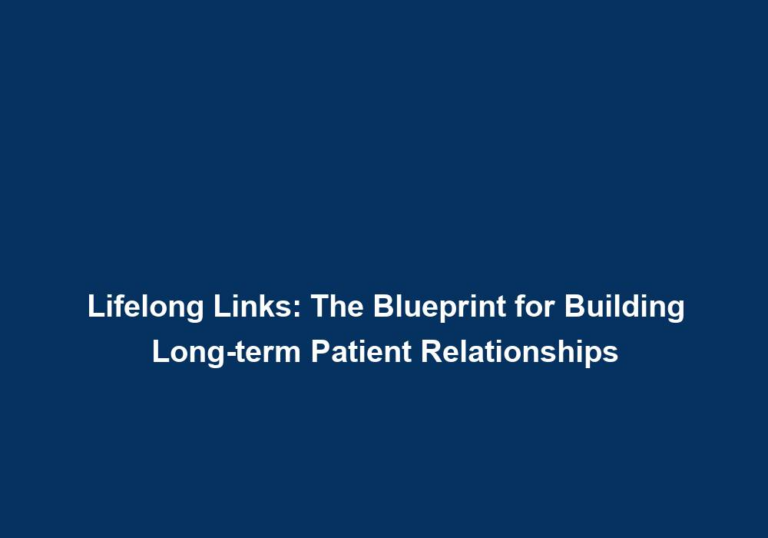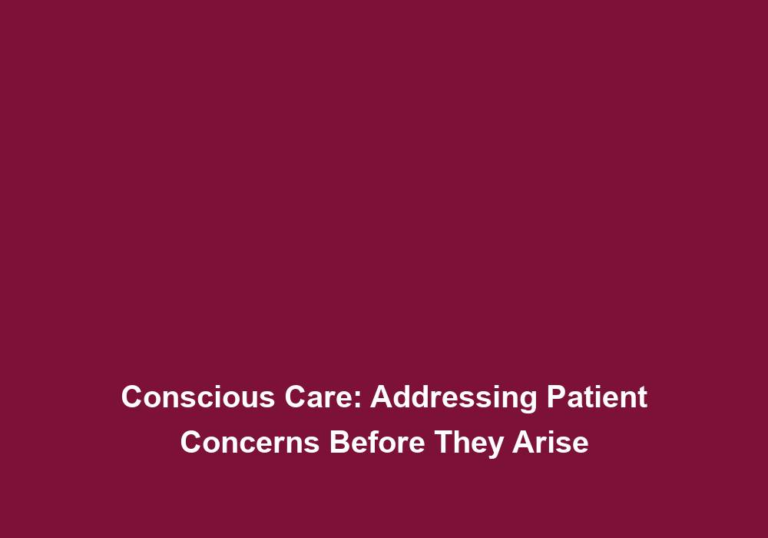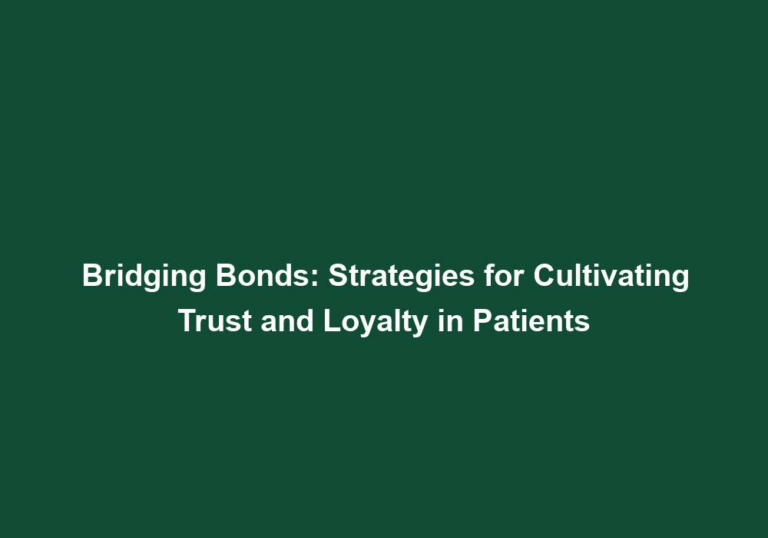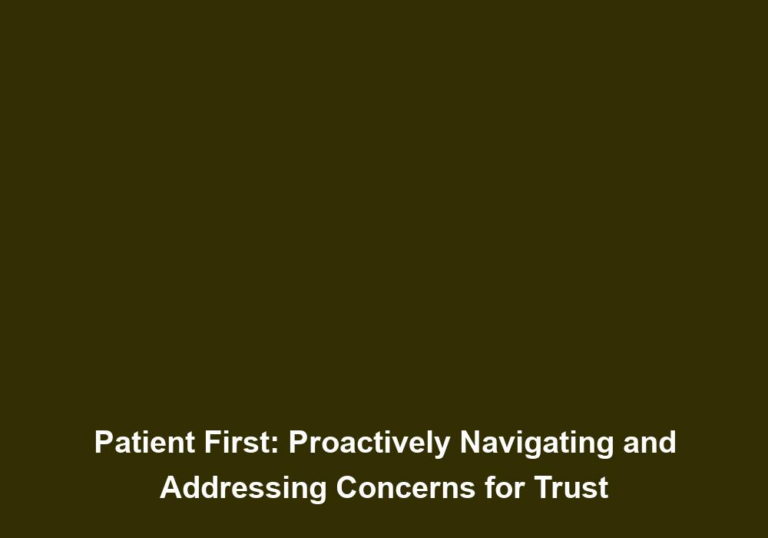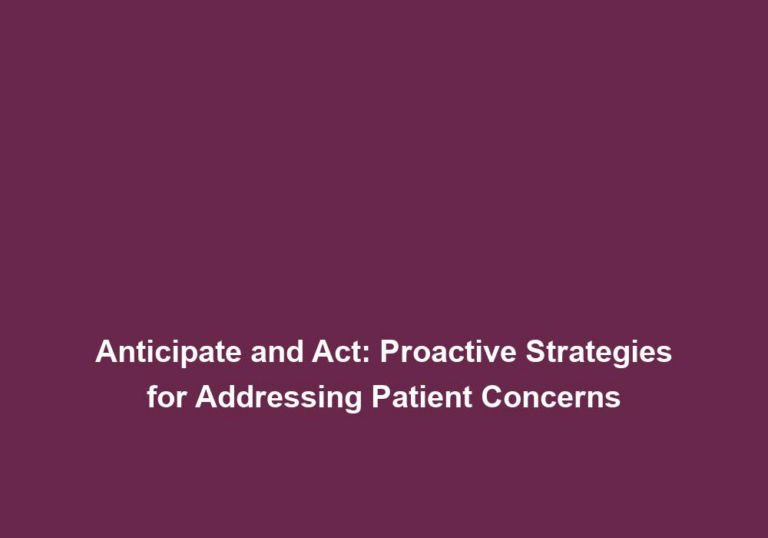Relationship Revolution: Strategies for Building Long-term Patient Relationships
In today’s rapidly evolving healthcare landscape, building and maintaining long-term patient relationships has become more crucial than ever. As the healthcare industry undergoes a relationship revolution, healthcare providers are realizing the immense value of nurturing strong connections with their patients. Not only does this lead to improved patient satisfaction, but it also contributes to better health outcomes and loyalty. In this article, we will explore effective strategies that healthcare providers can employ to build and foster long-term patient relationships.
1. Cultivate Trust and Communication
The foundation of any successful relationship is trust, and the doctor-patient relationship is no exception. Healthcare providers must focus on cultivating trust by ensuring open and transparent communication with their patients. Here are some strategies to consider:
-
Active Listening: Taking the time to truly listen to your patients is essential for building trust. By showing empathy and understanding their concerns, you create a safe environment where patients feel valued and heard.
-
Effective Communication: Using clear and concise language is crucial when explaining medical conditions, treatment options, and procedures. Avoiding jargon and encouraging patients to ask questions ensures that they fully understand the information provided. This promotes a sense of empowerment and active participation in their own care.
-
Follow-up: Staying connected with your patients beyond the initial visit is key to building trust and maintaining a long-term relationship. Following up with them after appointments, procedures, or hospitalizations shows your commitment to their well-being. Address any lingering questions or concerns they may have to provide comprehensive support.
Building trust and effective communication with patients requires a continuous effort. By implementing these strategies, healthcare providers can establish strong foundations for long-term patient relationships.
2. Personalize the Patient Experience
Patients appreciate personalized care that makes them feel valued and understood. By tailoring your interactions to each patient’s unique needs, preferences, and circumstances, you can significantly enhance their overall experience. Consider the following approaches:
-
Individualized Treatment Plans: Developing customized treatment plans that consider patients’ medical history, lifestyle, and personal goals is essential for building long-term relationships. This approach shows patients that you are addressing their specific needs and actively involving them in their own care. By understanding their preferences and goals, you can collaborate with them to create a treatment plan that aligns with their values.
-
Personal Touch: Addressing patients by their preferred name, actively engaging in conversation beyond medical concerns, and remembering personal details about their lives can make a significant difference in building rapport and trust. These small gestures demonstrate that you see them as individuals, not just as patients, and you value their unique experiences.
-
Patient Education: Empowering your patients with educational resources that are tailored to their conditions or concerns is crucial for their active participation in their own care. Providing them with information about their health conditions, treatment options, and self-management strategies equips them with the knowledge they need to make informed decisions. This fosters a sense of empowerment and strengthens the patient-provider relationship.
By personalizing the patient experience, healthcare providers can create a supportive environment that promotes long-term patient relationships and improves overall satisfaction.
3. Embrace Technology and Digital Solutions
In today’s digital age, technology plays a vital role in patient engagement and relationship building. By leveraging various digital solutions, healthcare providers can enhance communication, streamline processes, and improve patient satisfaction. Consider the following strategies:
-
Patient Portals: Offering secure online platforms where patients can access their medical records, schedule appointments, request prescription refills, and communicate with their healthcare team can greatly enhance patient-provider communication. This convenience fosters engagement and empowers patients to take an active role in managing their health.
-
Telemedicine: Embracing telemedicine allows healthcare providers to provide virtual consultations, follow-ups, and remote monitoring. This not only enhances access to care, especially for those with limited mobility or residing in remote areas, but also strengthens the patient-provider relationship by ensuring ongoing support and communication.
-
Mobile Apps: Developing user-friendly mobile applications that allow patients to track their health metrics, set reminders for medications, access educational resources, and communicate with their healthcare team promotes patient empowerment and facilitates proactive self-management. This level of convenience and accessibility strengthens the patient-provider relationship by enabling patients to actively participate in their care.
By embracing technology and digital solutions, healthcare providers can enhance patient engagement, improve communication, and ultimately build stronger and more sustainable long-term patient relationships.
4. Provide Exceptional Customer Service
A positive and memorable patient experience goes a long way in building long-term relationships. Exceptional customer service should be at the forefront of every healthcare provider’s strategy. Consider implementing the following tactics:
-
Timely Appointments: Minimizing wait times and ensuring efficient appointment scheduling is crucial for providing exceptional customer service. Respecting patients’ time by promptly attending to their needs and minimizing any unnecessary delays demonstrates your commitment to their care and contributes to a positive patient experience.
-
Friendly and Knowledgeable Staff: Training your staff to provide friendly and compassionate care is essential for building trust and loyalty. Encouraging active engagement with patients, demonstrating a genuine interest in their well-being, and addressing their concerns with empathy and expertise creates a welcoming environment that fosters long-term relationships.
-
Follow-up and Feedback: After appointments or procedures, following up with patients to ensure their satisfaction and address any concerns is an essential part of providing exceptional customer service. Encouraging feedback allows you to continually improve your services and patient experience, showing patients that their opinions and experiences matter.
By prioritizing exceptional customer service, healthcare providers can create a positive and supportive environment that strengthens patient relationships and promotes long-term loyalty.
5. Engage with Patients Outside the Clinic
Building long-term patient relationships extends beyond the walls of the clinic. Engaging with patients outside traditional healthcare settings helps foster trust, loyalty, and a sense of community. Consider the following approaches:
-
Community Outreach: Actively participating in community events, health fairs, and educational sessions allows healthcare providers to demonstrate their commitment to the community’s well-being. This involvement provides opportunities for patients to engage with you on a personal level, fostering a sense of connection and trust.
-
Social Media Presence: Maintaining an active presence on social media platforms enables healthcare providers to share valuable healthcare information, tips, and success stories with a wider audience. Responding promptly to comments and inquiries encourages patient engagement and demonstrates your dedication to providing ongoing support and education.
-
Support Groups: Establishing or facilitating patient support groups can be a powerful way to connect individuals with similar health conditions or concerns. These groups provide a safe space for patients to share experiences, provide emotional support, and learn from one another. By facilitating these connections, healthcare providers contribute to a sense of community and foster long-term patient relationships.
In conclusion, the relationship revolution in healthcare necessitates a shift towards building strong and long-lasting connections with patients. By focusing on trust, communication, personalization, technology integration, exceptional customer service, and community engagement, healthcare providers can cultivate meaningful relationships that benefit both patients and providers alike. Embracing these strategies will not only enhance patient satisfaction but also contribute to improved health outcomes and sustainable success in the healthcare industry.


